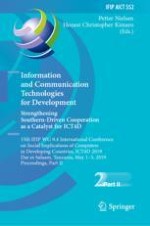The two volumes IFIP AICT 551 and 552 constitute the refereed proceedings of the 15th IFIP WG 9.4 International Conference on Social Implications of Computers in Developing Countries, ICT4D 2019, held in Dar es Salaam, Tanzania, in May 2019.
The 97 revised full papers and 2 short papers presented were carefully reviewed and selected from 185 submissions. The papers present a wide range of perspectives and disciplines including (but not limited to) public administration, entrepreneurship, business administration, information technology for development, information management systems, organization studies, philosophy, and management. They are organized in the following topical sections: communities, ICT-enabled networks, and development; digital platforms for development; ICT for displaced population and refugees. How it helps? How it hurts?; ICT4D for the indigenous, by the indigenous and of the indigenous; local technical papers; pushing the boundaries - new research methods, theory and philosophy in ICT4D; southern-driven human-computer interaction; sustainable ICT, informatics, education and learning in a turbulent world - "doing the safari way”.
